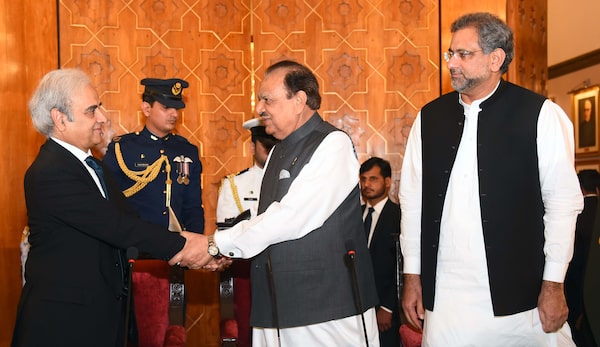
Pakistan’s President Mamnoon Hussain, centre, greets caretaker Prime Minister Nasir-ul-Mulk, left, as outgoing prime minister Shahid Khaqan Abbasi looks on during an oath-taking ceremony at The President House in Islamabad, June 1, 2018.HANDOUT/Getty Images
A former Pakistani chief justice was sworn in on Friday as the caretaker prime minister for an interim period of two months, hours after Pakistan’s president dissolved the powerful lower house of parliament.
It was only the third time in Pakistan’s history that the National Assembly finished its five-year term. Nasir-ul-Mulk, who has a reputation as a defender of democratic institutions, will run the government pending results of July 25 parliamentary elections.
President Mamnoon Hussain administered the oath of office at a ceremony attended by the political and military leadership.
Incumbent Prime Minister Shahid Khaqan Abbasi resigned at midnight Thursday, ending a brief but turbulent tenure since July 2017 when he replaced Nawaz Sharif who was dismissed by the Supreme Court for concealing financial assets abroad, a disclosure stemming from leaked documents known as the Panama Papers.
Sharif is now on trial for corruption and has been barred from running for office. However, his ruling Pakistan Muslim League party remains the strongest in parliament.
Both the PML and the opposition had agreed on Mulk, who served as Pakistan’s chief justice from 2014 to 2015, as interim premier. Pakistan’s constitution mandates new elections to be held within 60 days.
Mulk’s main job will be to supervise the July elections. On Sunday, candidates will begin submitting their nominations for the National Assembly and provincial assemblies. They have until June 6 to register.
Whoever wins majority in parliament will name the next prime minister.
Mulk was welcome by almost all political parties and figures, including Imran Khan, the country’s popular opposition leader and former cricket star who aspires to become the next prime minister after the July elections.
Khan played a key role in Sharif’s ouster and has long campaigned against the PML.
Also Friday, Pakistan’s Supreme Court overturned a decision last month by a lower court that disqualified former Foreign Minister Khawaja Mohammad Asif from office after Khan’s party claimed he had also concealed assets abroad.
The reversal of Asif’s disqualification allows him to take part in the July elections.